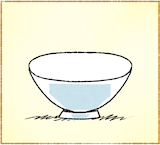
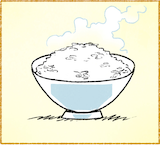
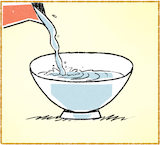
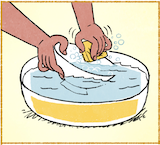
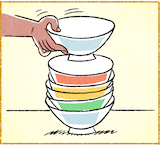
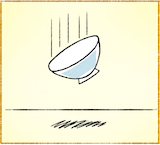
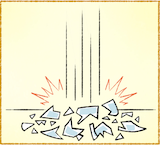
นี้คืออี่หยัง อันนี้เป็นถ้วย
ถ้วยเป่า บ่มีอี่หยังอยู่ในถ้วยเลย
ถ้วย[อัน]ใบใหญ่บ่ ใหญ่อยู่ ถ้วยใบนี้มันกะใบใหญ่อยู่ แต่บ่ใหญ่หลาย
ถ้วยอันนี้เอาไว้เฮ็ดหญัง ถ้วยอันนี้ใซ้ปะโยดได้หลายอย่าง เอาใส่แนวกินกะได้ ใส่อี่หยังกะได้ที่เฮาสิเอามากิน ใส่เข้ากะได้ ใส่อันนั้นอันนี้ ใส่ได้เบิดซู่สิ่งซู่อย่าง ว่าแต่เฮาอยากเอาอี่หยังลงไปในถ้วยนี้ หลือว่าใส่ลงไปในถ้วยนี้
12
อันนี้คือหญัง อันนี้กะเป็นถ้วยคือเก่านั้นหละ อันนี้กะเป็นถ้วย
แต่ว่าถ้วยใบนี้มีเข้าพ้อม มีเข้าบักหลายเติบหนึ่งอยู่ในถ้วยนี้ กำลังฮ้อนอยู่
มีควนลอยอ่มๆ ขึ้นไปพ้อม เข้าอันนี้คือสิฮ้อนคัก
เข้าอันนี้กะสิเข้าจุ่นพู่นอยู่ เป็นตาแซบๆ เป็นตากินกับแนวกินแซบคัก
13
เขากำลังเฮ็ดหญัง เขากำลังเทน้ำลงไปในถ้วย
แล้วเขาเทน้ำลงไปในถ้วยเฮ็ดหญัง จักคือกัน เขาอาดสิเอาไปกิน หลืออาดสิเอาไปเฮ็ดสิ่งต่างๆ กะได้ เขากะเลยเทน้ำลงไปในถ้วย
เขาเทน้ำใส่ถ้วยหลายบ่ กะหลายอยู่ หลายเติบ เกียบเต็มถ้วยเอาโลด เทโจ้กๆ ลงเอาโลด บ่เบิ่งว่ามันสิเต็มหลือบ่เต็ม
14
เขากำลังเฮ็ดหญัง เขากำลังล้างถ้วย เขากำลังล้างถ้วยอยู่
เขาล้างถ้วยเฮ็ดหญัง มันอาดสิสกกะปก หลือว่าบ่สะอาด เขากะเลยล้างถ้วย เขาอาดสิเอาถ้วยนี้ไปเฮ็ดแนวกิน หลือว่าเอาไปใส่แนวกินกะได้
เขาใซ้มือของเขาสองข้างล้างถ้วย มือหนึ่งกะจับฟองน้ำ แล้วกะถูๆๆ ฮุๆ อยู่ในถ้วยนั้น อีกมือหนึ่งกะจับถ้วย ไว้บ่ให้มันดิ้น หลือว่าบ่ให้มันหลุดมือไปใส แล้วเขากะล้างๆๆ เพื่อที่สิให้ถ้วยนี้มันสะอาด หลือว่าเกี้ยงนั้นหละ
15
เขากำลังเฮ็ดหญัง เขากำลังวางถ้วยซ้อนกัน
จักว่าเขาเอาถ้วยอันนี้มาแต่ใส หลายกะด้อกะเดี้ย บักหลายใบเอาโลด เทิงมีสีแดง สีฟ้า สีเหลียง สีเขียว มีเบิดซู่สีเอาโลด บักหลายใบหนึ่ง ถ้วยนี้กะเดย
เขาเอาถ้วยมาวางซ้อนกันเฮ็ดหญัง จักคือกัน เขาอาดสิเอามาเก็บให้มันเป็นละเบียบ ให้มันสะอาดหูสะอาดตา หลือว่าให้มันเป็นที่เป็นทางกะได้ หลือว่าเขาอาดสิล้างแล้ว เขากะมาวางซ้อนกันไว้ซื่อๆ
16
นี้คืออี่หยัง อันนี้กะคือถ้วย มันกำลังตก
จักว่ามันตกมาแต่ใส มันกำลังลอยตกลงมา กำลังหล่นตกลงมาพุ้นหนะ
มันตกลงมาจักใบ มันตกลงมาใบเดียว ใบเดียวข้อหล้อ กำลังหล่นตกลงมา
ขั้นมันตกแล้วมันสิแตกบ่ จักคือกัน กะอาดสิแตก
ขั้นมันเป็นแก้ว มันตกลงมาแล้ว มันกะสิแตก แต่ว่าขั้นมันเป็นพะสะติก หลือว่าเป็นที่แนวมันแตกบ่ได้ มันกะสิบ่แตก
17
อันนี้มันคืออี่หยัง อันนี้กะคือเสดแก้ว มันอาดสิเป็นถ้วย หลือว่าเป็นแก้วที่มันตกลงมา ตกลงมาจากหม้องสูงๆ หลือว่าตกลงมาจากโต่ะ ตกลงมาพื้นแล้วมันกะสิแตก เพาะว่ามันเป็นแก้ว หลือว่าเป็นกะจก
เหลียวเบิ่งมันแตกแล้ว มันกองเอ่าะเญาะอยู่นำพื้นพุ้นหนะ ขั้นพุใดไปเหยียบ กะสิเฮ็ดให้เป็นบาดหลือเป็นแผ เพาะว่าเสดแก้วนี้มันคมหลาย เสดอันนี้มันคมคักอี่หลี
Link to overview page
Link to dictionary
| Isaan | Pronunciation | Tones | Thai | English/Notes |
|---|---|---|---|---|
| นี้ | ni: | HF | นี้ | 1. this 2. here |
| คือ | khʉ: | HR | คือ | 1. to be, to resemble, like, as 2. why {บักหล้าคือบ่เก็บโต่ะแน่ = [addressing a young boy] Why haven't you cleared the table?} |
| อี่หยัง | i:-yaŋ | H-M | อะไร | 1. what {นี้คืออี่หยัง = What is this?} {มื้อนี้เจ้าเฮ็ดอี่หยัง = What are you doing today?} {กินเข้างายกับอี่หยัง = What did you have for breakfast?} 2. something, anything, (in negations) nothing {บ่ต้องเฮ็ดอี่หยังอีกเลยนอกจากใส่ปุย = [we] don't need to do anything besides adding fertilizer} |
| อัน | an | M | อัน | 1. thing, object 2. general clf. for objects |
| เป็น | pen | M | เป็น | 1. to be, to exist 2. to be able to 3. to suffer, sth. happens to 4. เป็นหญัง[...]คือ in initial position: why? {เป็นหญังเขากะคือแปงฟัน = Why is he brushing his teeth?} {เป็นหญังเคี่ยงบินมันคือสิตก = Why is the airplane falling down?} |
| ถ้วย | thu:ai | LF | ถ้วย | small bowl |
| เป่า | pao | H | เปล่า | empty |
| บ่ | bɔ: | H | ไม่ | 1. no, not 2. question particle, transforming a statement into a question Notes: spelling exception in line with common usage on social media |
| มี | mi: | HR | มี | 1. to have 2. there is |
| อยู่ | yu: | H | อยู่ | 1. to be (located) at 2. yet, still 3. auxiliary indicating continuous or progressive action {ทอดปาอยู่ในกะทะ = (in the process of) frying a fish in the pan} {แม่กำลังเมี้ยนเฮียนอยู่ = mother is cleaning/tidying up the house} |
| ใน | nai | HR | ใน | in, within |
| เลย | lə:i | HR | เลย | 1. futher on, beyond, past {เข็มน้อยเลยเลขสิบสองไป = the minute hand has passed number twelve} 2. too much 3. at all 4. definitively 5. completely, utterly |
| ใบ | bai | M | ใบ | 1. leaf {ต้นไม้มีใบสีเขียว = the tree has green leaves} 2. banknote {เทิงมีใบพ้อม เทิงมีเหลียนพ้อม = there are notes as well as coins} 3. clf. for leaves, bank notes, helmets, bowls, jars, pots, boxes {ใบบัว = lotus leaf} {ก่องใบน้อย = a small box} {หม้อใบนี้มีฝาพ้อม = the pot here has a lid, too} {ถ้วยใบสีแดง = a red bowl} |
| ใหญ่ | ɲai | H | ใหญ่ | large, big |
| มัน | man | HR | มัน | it (also used to refer to people) |
| กะ | ga | M | ก็ | 1. then, consequently 2. also |
| แต่ | tɛ: | H | แต่ | 1. but {แต่บ่ต่างกันหลาย = but not very different} {แต่บ่ลู้ว่าเขาญ่างมาแต่ใส = but [I] don't know where he's coming from, see also: แต่ว่า} 2. only {ตอนนี้มีแต่ขี้ฝ้า = now there are only clouds} |
| หลาย | la:i | M | เยอะ, มาก | many, much, very |
| เอา | ao | M | เอา | to take, to give {เขากำลังเอาก่องไปซั่ง = he's taking the boxes to weigh them} {หมอกำลังเอายาให้คนป่วยกิน = the doctor is giving medicine to the patient} {เอาไว้ถ้า = is for, is used for, has the purpose of} |
| ไว้ | wai | HF | ไว้ | 1. to keep, to put, to place, to retain, to save, to reserve {เขาเอาหัวของเขาไว้ใส = Where does she put her head?} {หมาสิเลี้ยงไว้บ้าน = dogs are kept/raised in the house} {ไก่เลี้ยงไว้ในคอก = chicken are kept/raised in a coop} {หน้ามันบังไว้ = the face is covered/not visible} {เขาเอาโทละสับวางไว้หู = he holds the phone to his ear} 2. for {นาลิกาปุกมีไว้เฮ็ดหญัง = What is an alarm clock for?} {หม้อเอาไว้เฮ็ดแนวกิน = a pot is used to make food} {ก่องเอาไว้เฮ็ดหญัง ก่องเอาไว้ใส่ของ = What is the box for? It's for putting in stuff.} Notes: see also ไว้ถ้า |
| เฮ็ด | het | H | ทำ | to do, to make |
| หญัง | ɲaŋ | M | อะไร, เป็นหญัง = ทำไม | 1. what {เขากำลังเฮ็ดหญัง = What is he doing?} {ธูปเอาไว้เฮ็ดหญัง = What are incense sticks for?} 2. something, anything, (nothing) 3. เป็นหญัง[...]คือ in initial position: why {เป็นหญังเขาคือใส่บักพิกลงไปในกวยเตียว = Why is he putting chili in [his] noodle soup?} {เป็นหญังหน้าต่างมันคือเปิด = Why is the window open?} {เป็นหญังมันคือมีควนไฟ = Why is there smoke?} |
| ใซ้ | sai | HF | ใช้ | to use |
| ปะโยด | pa-yo:t | M-LF | ประโยชน์ | 1. benefit 2. useful |
| ได้ | dai | HF | ได้ | 1. can 2. to get, to obtain 3. before verb: indicating past tense 4. บ่ได้ + verb: not |
| อย่าง | ya:ŋ | H | อย่าง | type, kind, sort, category |
| ใส่ | sai | H | ใส่ | 1. to put something in/on {เขาใส่บักพิกในกวยเตียวหลาย = he's putting a lot of chili in his noodle soup} {เขาบีบยาสีฟันใส่แปงสีฟัน = he squeezes toothpaste on the toothbrush} {ก่องเอาไว้ใส่ของ = boxes are there to put stuff in} 2. to wear (clothes) {เขาใส่เสี้ยแขนญาว = he's wearing a long-sleeve} 3. directed at {เอิ้นใส่กัน = to call each other/to say to each other} {หมามันเห่าใส่แมว = the dog barks at the cat} {ล้องเพงใส่ไม = to sing into the microphone} {เขากำลังซี้มือไปใส่พุซาย = she's pointing at the man} |
| แนวกิน | nɛ:o-gin | HR-M | อาหาร | food {เฮ็ดแนวกิน = to prepare food} {ตำบักหุ่งเนี้ยกะสิเป็นแนวกิน = papaya salad is (a kind of) food} |
| ที่ | thi: | H | ที่ | 1. that, which {คนที่ยืนอยู่ฝั่งขวา = the person which is standing on the right = the person standing on the right} {เว้าคำที่บ่สุพาบ = to speak words which are impolite = to speak impolitely} 2. for ordinal numbers {ที่สาม = third} |
| เฮา | hao | HR | เรา | 1. personal pronoun: we 2. personal pronoun: I |
| สิ | si | M | จะ | future tense auxiliary {เขากำลังสิตื่น = he's about to wake up} {สิไปตะหลาด = [I'm] going to the market} |
| มา | ma: | HR | มา | 1. to come 2. auxiliary expressing action towards the present or focal time {กะคุเฮ็ดมาจากอี่หยัง = What is the bucket made of?} {แล้วเขากะเก็บเงินจากพุนั้นมา = and then she takes the money of that person} |
| กิน | gin | M | กิน | to eat, to consume, to use |
| เข้า | khao | LF | ข้าว | rice {กินเข้า = to eat} {ปูกเข้า, เฮ็ดเข้า = to grow/plant rice} {เกี่ยวเข้า = to harvest rice} {กับเข้า = courses eaten with rice} |
| นั้น | nan | HF | นั้น | that, there |
| เบิด | bə:t/bət | LF/M | หมด | 1. completely, totally, entirely {เทิงเบิด = all of them} {เบิดมื้อเบิดค่ำ = [all] day and night} {ขั้นพุโดยสานลงลดไฟเบิดแล้ว [...] = when all passengers have disembarked […]} {เขากินเบิดบ่ = Has he eaten all of it?} 2. to be finished, to be exhausted, to come to an end, to have no more {โน่ดบุ่กแบ็ดเบิด = the notebook is out of battery/the notebook needs recharging} |
| ซู่สิ่งซู่อย่าง | su:-siŋ-su:-ya:ŋ | H-H-H-H | ทุกสิ่งทุกอย่าง | everything, all things/kinds/etc. |
| ว่าแต่ | wa:-tɛ: | H-H | แล้วแต่ | whatever, anything that {ว่าแต่ใส่แล้วมันแซบกะใส่ลงไป = whatever is tasty can be put in} |
| อยาก | ya:k | LF | อยาก | to want, to wish |
| ลง | loŋ | HR | ลง | 1. to descend, to lower, to go down 2. down 3. bus/train etc.: to get off, to disembark {คนกำลังลงลดบั่ด = people are getting off the bus} 4. boat/ship etc.: to get on, to board {เขากำลังญ่างลงเลีย = he's boarding/getting on the boat} |
| ไป | pai | M | ไป | 1. to go 2. auxiliary indicating action extending into the future |
| หลือ | lʉ: | M | หรือ | or |
| ว่า | wa: | H | ว่า | 1. that, as {คำว่า X = the word X} 2. to say |
| คือเก่า | khʉ:-gao | HR-H | as before | |
| นั้นหละ | nan-la | HF-M | นั่นแหละ | auxiliary for emphasis at the end of a phrase |
| แต่ว่า | tɛ:-wa: | H-H | แต่ว่า | 1. but 2. only {ฮู้แต่ว่าเขายืนอยู่พุเดียว = I only know that he's standing there by himself} |
| พ้อม | phɔ:m | HF | พร้อม | at the same time, also, too {มีตะเว็นพ้อม = the sun's out, too} {กะทะมีด้ามพ้อม = the pan has also a handle} |
| บัก | bak | M | 1. intensifier before adjectives {ปาโตบักใหญ่ = a (very) large fish} 2. prefix in front of fruits and vegetables {บักแตงโม = watermelon} 3. can be used as a reference for a male person of the same or younger age {บักอันนี้ = this lad} |
|
| หลายเติบ | la:i-tə:p | M-LF | many, much, very (more intense than หลาย) | |
| หนึ่ง | nʉŋ | H | หนึ่ง | 1. one 2. after adjective: intensifier {บักคักหนึ่ง = very much} {อันบักใหญ่หนึ่ง = very large}, or attenuates the meaning {กะดาดมันแผ่นน้อยๆ หนึ่ง = the piece of paper is [relatively] small} |
| กำลัง | gam-laŋ | M-HR | กำลัง | auxiliary indicating continuous or progressive action |
| ฮ้อน | hɔ:n | HF | ร้อน | hot |
| ควน | khu:an | HR | ควัน | 1. smoke 2. steam |
| ลอย | lɔ:i | HR | ลอย | 1. to float, to swim 2. to soar 3. smoke/steam: to rise |
| อ่มๆ | om | H | gently, softly Notes: translation to be confirmed; see also อึ่มๆ, ฮึ่มๆ |
|
| ขึ้น | khʉn | LF | ขึ้น | 1. to go up, to increase 2. sun: to rise {ตะเว็นกำลังขึ้น = the sun is rising} 3. more 4. bus/train etc.: to get on, to board {พุโดยสานขึ้นลดไฟเบิดแล้ว = all passengers have boarded the train} |
| คัก | khak | H | intensifier: very, very much | |
| จุ่นพู่น | jun-phu:n | H-H | color: very white {(สี)ขาวจุ่นพู่น = very white} | |
| ตาแซบ | ta:-sɛ:p | M-HF | น่ากิน | 1. tasty looking, to be appetizing 2. to be sleeping well {นอนเป็นตาแซบหลาย = [he's] sleeping well} |
| ตา | ta: | M | ตา | as a prefix: likely, worthy, fit for (like Thai น่า-) {ตาฮัก = lovely/cute} {ตาสะออน = praiseworthy} {ตาหวาน = (of ice cream) [likely to be] sweet} {ตาอยู่ = to be a good place to be} Notes: see also various entries for ตา-, e.g., ตาแซบ, ตาพู่ฮ้าย, ตาย้าน, ตาอยากหัว, ตาฮัก, ตามีแฮง |
| กับ | gap | M | กับ | 1. and {ลุงกับป้า = uncle and aunt} {กวยเตียวหมูกับกวยเตียวไก่ = noodle soup with pork and noodle soup with chicken} 2. with, to {ค้ายๆ กับคำว่า ... = similar to the word ...} 3. prefix in front of foods {กับเข้า = side dishes eaten with rice} {เขากินกับกวยเตียว = he's eating noodle soup} |
| แซบ | sɛ:p | HF | อร่อย | 1. food: tasty {กวยเตียวมันแซบบ่ = Is the noodle soup tasty?} 2. sleep: well {เป็นตานอนแซบคัก = it looks as if she's sleeping very well} |
| เขา | khao | M | เขา | personal pronoun: he, she |
| เท | the: | HR | เท | to pour {เทน้ำลงไปในแก้ว = to pour water into a glass} |
| น้ำ | na:m | HF | น้ำ | 1. water 2. drink, soft drink, juice |
| แล้ว | lɛ:o | HF | แล้ว | 1. finished 2. already 3. and then, and next (especially แล้วกะ) 4. auxiliary for past tense |
| จัก | jak | M | จัก | 1. answer to a question: [I] don't know, don't know exactly, [I'm] not sure {พุซายคนนี้เขาเถ้าไป่ จัก จักเถ้าหลือบ่เถ้า เบิ่งบ่ค่อยออก = Is this man here already old? I don't know. I can't see clearly whether he's old or not.} {เขาเว้ากันอยู่ใส จักคือกัน = Where are they talking? I don't know either.} 2. exact(ly), what exactly {จักต้มอี่หยังกะบ่ฮู้ = I don't know what (exactly) he is cooking} {บ่ลู้คือกันจักปาอี่หยัง = I don't know either what kind of fish this is} 3. how much/many? {ต้นไม้มีจักต้น = How many trees are there?} {ตอนนี้จักโมงแล้ว = What time is it now?} {มือของเฮานี้สิมีจักนิ้ว = How many fingers do our hands have?} 4. a bit, a little bit {จักหน่อย/จักหน่อยหนึ่ง = a bit, a little bit} |
| คือกัน | khʉ:-gan | HR-M | เหมือนกัน | 1. also, likewise, similarly {ยินดีที่ได้ฮู้จักคือกันคับ = Nice to meet you too!} 2. in negative sentences: either {บ่ลู้คือกัน = I don't know either} {จักคือกัน = I don't know (either)} |
| อาด | a:t | LF | อาจ | 1. might, may, will 2. likely |
| สิ่ง | siŋ | H | สิ่ง | thing, object |
| ต่างๆ | ta:ŋ-ta:ŋ | H-H | ต่างๆ | different, various |
| เกียบ | gi:ap | LF | เกือบ | nearly, almost |
| เต็ม | tem | M | เต็ม | full |
| เอาโลด | ao-lo:t | M-HF | เอาเลย, ทำเลย, จริงๆ | in final position: intensifier {โตส่ำกะทะเอาโลด = [a fish] as large as the pan!} {เกียบเต็มถ้วยเอาโลด = the bowl is almost full!} {ทะนาคานมันสิไปตั้งไว้อยู่ซู่หม้องเอาโลด = banks are everywhere!} |
| โจ้กๆ | jo:k | HF | เสียงน้ำตกหรือไหล | splattering, sound of water pouring |
| เบิ่ง | bəŋ | H | ดู | 1. to look at, to see, to watch {เบิ่งโทละทัด = to watch TV} {เบิ่งหนัง = to watch a movie} 2. to guess {เบิ่งซงแล้ว ... = [I] guess / from what it looks like ...} |
| ล้าง | la:ŋ | HF | ล้าง | to wash |
| สกกะปก | sok-ga-pok | M-M-M | สกปรก | dirty |
| สะอาด | sa-a:t | M-LF | สะอาด | clean |
| มือ | mʉ: | HR | มือ | 1. hand 2. front leg/paw (e.g., of a cat) |
| ของ | khɔ:ŋ | M | ของ | of, belonging to |
| สอง | sɔ:ŋ | M | สอง | two |
| ข้าง | kha:ŋ | LF | ข้าง | 1. side {มีหูจับสองข้าง = there are handles on both sides} 2. next to {วางอยู่ข้างๆ ก่องใบใหญ่ = it's placed next to the large box} {เขายืนอยู่ข้างๆ อีกพุหนึ่ง = he's standing next to another person} 3. clf. for body parts which come in pairs (eyes, ears, legs etc.) {เขามีตาสองข้าง = she has two eyes} |
| จับ | jap | M | จับ | 1. to grasp, to hold {เขาจับมือกัน = they're holding hands} {เขายืนจับไอติมอยู่ = she's standing, holding an ice cream} 2. to catch, to arrest {จับพุล้าย = to arrest a criminal} |
| ฟองน้ำ | fɔ:ŋ-na:m | HR-HF | ฟองน้ำ | sponge {เขาใซ้ฟองน้ำสีเหลียงล้างซ้อนส้อม = he cleans the fork with a yellow sponge} |
| ถู | thu: | M | ถู | to scrub, to rub, to wipe, to clean |
| ฮุ | hu | H | ถู, เกา | to scrape, to scratch |
| อีก | i:k | LF | อีก | 1. more, again 2. other, another |
| ให้ | hai | LF | ให้ | 1. to give {หมอกำลังเอายาให้คนป่วยกิน = the doctor is giving the patient medicine} 2. for 3. to allow, to be allowed |
| ดิ้น | din | HF | ดิ้น | to wriggle |
| หลุดมือ | lut-mʉ: | M-HR | หลุดมือ | to slip out of the hand |
| ใส | sai | M | (ที่)ไหน | 1. where? {สิไปใส = Where are [you] going?} {มาแต่ใส = Where are [you] coming from?} {กะทะอยู่ใส = Where's the pan?} 2. somewhere, anywhere {ใสกะได้ = anywhere, wherever you like} |
| เพื่อที่ | phʉ:a-thi: | H-H | เพื่อที่ | in order to, so that Notes: the vowel เอือ is likely to be a Thai loan |
| เกี้ยง | gi:aŋ | HF | สะอาด | smooth, polished, clean |
| วาง | wa:ŋ | HR | วาง | to place, to set/put down {โทละสับ/phone: วางสาย = to hang up} {มีเกิบวางอยู่ในก่อง = there are shoes in the box} {มือข้างหนึ่งเขาวางอยู่เทิงโต่ะ = he's put one of his hands on the table} |
| ซ้อน | sɔ:n | HF | ซ้อน | to pile up, to put on, to lay on top of, to stack {เอาถ้วยวางซ้อนกัน = to pile up/stack bowls} {พุซ้อน = passenger, e.g., of a motorbike or tuk tuk} |
| กัน | gan | M | กัน | mutual, each other, with another, together {เขากำลังนั่งเว้ากัน = they're sitting and talking} {เขาสองคนฮักกัน = they love each other} {ปาสองโตนี้ ใหญ่ห่างกันหลายบ่ = These two fish here, are they very different in size (from each other)?} {ต่างกัน = to be different (from each other)} {ก่องอันไหนหนักกว่ากัน = Which box is heavier (than the other(s))?} |
| แต่ใส | tɛ:-sai | H-M | จากไหน | where from? |
| กะด้อกะเดี้ย | ga-dɔ:k-ga-di:a | M-HF-M-HF | มากมาย, มากเกินไป | intensifier: very, very much |
| เทิง | thə:ŋ | HR | ทั้ง | 1. up to, all, all of, the whole of, altogether {เขาใส่กางเกงขาสั้นเทิงสองคน = both are wearing short trousers} {เขาเป็นพ่อของลูกเทิงสามคนนี้ = he's the father of these three [children] here} 2. เทิง ... เทิง ...: both ... and ..., ... as well as ... {เทิงมีใบพ้อม เทิงมีเหลียนพ้อม = there are notes as well as coins} Notes: pronunciation: also realized as ทัง |
| สี | si: | M | สี | 1. color 2. colored pencil, crayon |
| แดง | dɛ:ŋ | M | แดง | red |
| ฟ้า | fa: | HF | ฟ้า | 1. sky {เคี่ยงบินมันกำลังบินขึ้นฟ้า = the airplane is taking off into the sky} 2. color: blue |
| เหลียง | li:aŋ | M | เหลือง | yellow |
| เขียว | khi:ao | M | เขียว | green |
| ซู่ | su: | H | 1. all, entire 2. every, any {ซู่พุซู่คน = everybody} {ซู่สิ่งซู่อย่าง = everything} {ไก่ต้องกินเข้าซู่มื้อ = chicken need to eat every day} {ซู่คนสิมีขาเอาไว้ถ้าญ่าง = everybody has legs to walk} |
|
| กะเดย | ga-də:i | M-M | final particle | |
| เก็บ | gep | M | เก็บ | 1. to collect, to gather, to accumulate, to pick/harvest {เก็บเงิน = to save money} {in a restaurant: เก็บเงิน = to get the bill} {เก็บน้ำ = to collect and store water} {เก็บผัก = to harvest vegetables} 2. to keep 3. to take in, to put away, to tidy up |
| ละเบียบ | la-bi:ap | H-LF | ระเบียบ | 1. order, system, proper arrangement 2. orderly, tidy, neat |
| สะอาดหูสะอาดตา | sa-a:t-hu:-sa-a:t-ta: | M-LF-M-M-LF-M | 1. tidy, neat and tidy, in good order 2. neatly, orderly |
|
| เป็นที่เป็นทาง | pen-thi:-pen-tha:ŋ | M-H-M-HR | เป็นที่เป็นทาง | neatly, orderly |
| ซื่อๆ | sʉ: | H | เฉยๆ | 1. just so 2. so-so |
| ตก | tok | M | ตก | 1. to fall, to drop 2. sun: to set {ตะเว็นตกดิน = the sun is setting} |
| หล่น | lon | H | หล่น | 1. to drop 2. to fall off |
| พุ้นหนะ | phun-na | HF-H | นู่นแหละ | auxiliary for emphasis at the end of a phrase Notes: variant of พุ้นหละ |
| เดียว | di:ao | M | เดียว | only, alone, single |
| ข้อหล้อ | khɔ:-lɔ: | LF-LF | เท่านั้น, ขนาดนั้น, น้อยๆ | only {ต้นไม้มีต้นเดียว ต้นเดียวข้อหล้อ = there's one tree, only one tree} {มีบ้านหลังเดียวข้อหล้อ = there's only one house} |
| ขั้น | khan | LF | เมื่อ | when, if |
| แตก | tɛ:k | LF | แตก | 1. to break, to shatter 2. to be broken, to be shattered 3. to sprout {เม็ดเข้าสิแตก = the rice seeds will sprout} 4. of sweat: to break {เหี่ยแตก = to sweat} |
| แก้ว | gɛ:o | HF | แก้ว | glass {ขวดแก้ว = glass bottle} |
| พะสะติก | pha-sa-tik | H-M-M | พลาสติก | plastic |
| แนว | nɛ:o | HR | 1. kind, sort, type 2. method, mode of action - and the corresponding tool or object, thing {แนวนุ่งห่ม = clothes, clothing} {แนวคม = sharp object [e.g., a pair of scissors]} {แนวถือ = handle} 3. clf. for words starting with แนว {กินแนวอันนั้น = กินแนวกินอันนั้น = to eat this food [which was talked about earlier]} |
|
| เสด | se:t | LF | เศษ | 1. bits and pieces 2. remants |
| จาก | ja:k | LF | จาก | 1. from {... เฮ็ดมาจากอี่หยัง = ... is made from what?} 2. to depart |
| หม้อง | mɔŋ | LF | ที่, แห่ง, บริเวณ | 1. place, area {หลายที่หลายหม้อง = in many places} {หม้องใดหม้องหนึ่ง = some place} 2. clf. for places |
| สูง | su:ŋ | M | สูง | high, tall |
| โต่ะ | to | H | โต๊ะ, เก้าอี้ | 1. table 2. chair |
| พื้น | phʉ:n | HF | พื้น | 1. floor, ground 2. surface, area {หล่นลงไปลงพื้น = [it] falls to the ground} {เขานั่งอยู่เทิงพื้น = he's sitting on the floor} |
| เพาะว่า | phɔ-wa: | H-H | เพราะว่า | because |
| กะจก | ga-jok | M-M | กระจก | 1. glass, glass pane, glass panel 2. mirror |
| เหลียว | li:ao | M | เหลียว | 1. to turn 2. to look |
| กอง | gɔ:ŋ | M | กอง | 1. pile, heap {กองไฟ = bonfire, campfire (see separate entry)} {กองฟืน = bonfire, campfire, a pile of logs/pieces of wood} {กองเฟียง = haystack} 2. to pile, pile up, heap, stack {วางกองกันอยู่ = being piled up} |
| เอ่าะเญาะ | ɔ-ɲɔ | H-H | รวมๆ กัน, วางกองกัน | in a (loose) pile |
| นำ | nam | HR | 1. at, in 2. with, together with {บ่สามาดถือไปนำได้ = [you] can't carry it around} {กินบักแตงโมนำเฮาบ่ = Will you eat watermelon with me?} 3. to lead, to accompany, to go with {เด็กน้อยญ่างไปนำแม่ = the daughter follows her mother} |
|
| พุใด | phu-dai | H-M | ใคร | 1. who {มีพุใดโทมากะบ่ลู้ = I don't know who has called} {ห้องนอนของพุใด = whose bedroom (is this)? } 2. someone, somebody, anybody, in negative context: nobody {บ่มีพุใดอยู่กับเขาเลย = there's nobody with him} |
| เหยียบ | yi:ap | LF | เหยียบ | to step on, to tread on, to run over |
| บาด | ba:t | LF | บาด | to injure, to wound, to cut |
| แผ | phɛ: | M | แผล | wound |
| คม | khom | HR | คม | 1. sharp {กันไกมันคม = the pair of scissors is sharp} {แข้วหมามันคม = dog's teeth are sharp} {ขวนมันคมบ่ = Is the axe sharp?} 2. blade, sharp edge of a knife etc. {เกี่ยวมีคมคือกันกับมีด = a scythe has a blade like a knife} |
| อี่หลี | i:-li: | H-M | จริง | intensifier: really Notes: pronunciation: also realized as อี่หลิ |